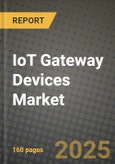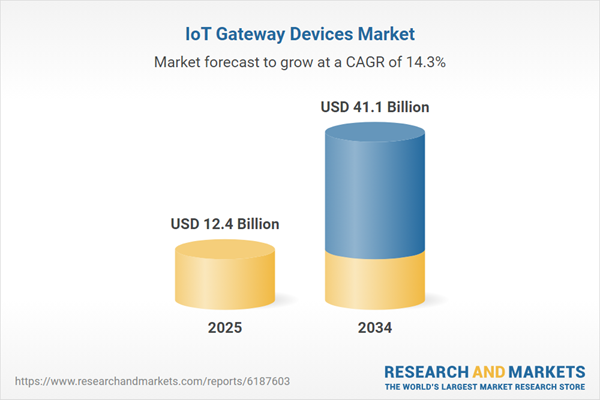The IoT Gateway Devices Market centers around hardware that bridges the gap between edge devices (such as sensors, actuators, and machines) and the cloud or data centers. These gateways aggregate, filter, and process data from local IoT networks before securely transmitting it to the cloud or enterprise systems for further analysis. Beyond data routing, modern IoT gateways also offer compute capabilities, protocol translation, security enforcement, and connectivity management. They are critical for enabling real-time decision-making, especially in industrial, healthcare, energy, and smart city applications where latency, reliability, and interoperability are vital. As IoT deployments become more complex and geographically dispersed, gateway devices serve as the foundation for scalable, efficient, and secure IoT architectures.
demand for IoT gateway devices surged in sectors like manufacturing, utilities, and retail. Companies such as Advantech, Cisco, HPE, and Dell launched compact, edge-intelligent gateways capable of handling AI workloads and supporting protocols like MQTT, Modbus, and Zigbee. Gateways were increasingly deployed in factories for edge analytics and predictive maintenance. In the energy sector, utilities used ruggedized gateways to monitor grid assets in remote or harsh environments. Retailers adopted gateways to connect smart shelves, POS systems, and inventory sensors for unified in-store management. The integration of 5G modules into gateways gained momentum, enabling high-speed, low-latency communication for real-time applications. Cybersecurity features such as TPM chips, secure boot, and OTA updates became standard across new product launches.
The IoT gateway devices will continue evolving into multi-functional, AI-powered edge nodes. Integration with machine learning models will allow for faster event detection and autonomous responses at the edge, minimizing reliance on central cloud systems. Gateways will support hybrid cloud architectures, dynamically routing data between local, edge, and public cloud environments based on context and cost. The rise of open-source gateway software and containerized workloads will make it easier for developers to deploy custom applications. In smart cities, gateways will be embedded into infrastructure for traffic, lighting, and public safety management. Industrial applications will demand intrinsically safe gateways for hazardous environments. As the edge becomes more intelligent and autonomous, IoT gateways will play a central role in unlocking the next phase of decentralized digital transformation.
Key Insights: IoT Gateway Devices Market
- The analyst highlights the emergence of AI-enabled IoT gateways that process data locally using built-in inferencing engines, allowing for real-time anomaly detection and decision-making without cloud dependence.
- 5G integration in gateway devices is trending, providing high-speed, low-latency connectivity for critical applications such as autonomous systems, remote monitoring, and AR-enabled industrial operations.
- According to the analyst, open-source gateway platforms with container support (e.g., Docker, Kubernetes) are gaining traction, enabling developers to rapidly deploy and manage edge applications.
- Ruggedized and intrinsically safe gateway devices are in demand for deployment in harsh environments, including oil & gas fields, mines, and outdoor utility infrastructures with extreme temperature or vibration exposure.
- Multi-protocol support and auto-translation capabilities are trending, enabling seamless data flow across diverse industrial IoT ecosystems that use legacy and modern communication standards.
- The analyst identifies the exponential increase in edge data volume as a core driver, pushing businesses to deploy gateways that enable local data filtering and reduce network bandwidth consumption.
- Industrial automation and predictive maintenance initiatives are driving demand for intelligent gateways that integrate directly with PLCs and SCADA systems, says the analyst.
- The analyst notes that the need for resilient connectivity in remote or bandwidth-constrained areas is fueling adoption of multi-network gateways with LTE, satellite, or mesh capabilities.
- The shift toward decentralized IT and hybrid edge-cloud infrastructures is encouraging organizations to invest in programmable gateways that can host edge applications and enforce security policies.
- The analyst highlights integration complexity as a challenge, with legacy industrial systems requiring extensive protocol mapping and configuration to interface seamlessly with modern IoT gateway hardware.
- According to the analyst, managing large fleets of geographically dispersed gateways - including updates, security patches, and monitoring - remains a logistical and cybersecurity challenge for enterprises without centralized orchestration tools.
IoT Gateway Devices Market Segmentation
By Type
- Consumer Internet Of Things (IoT) Gateway
- Industrial Or Commercial Internet Of Things (IoT) Gateway
By Component
- Microcontroller Unit (MCU)
- Field Programmable Gate Arrays (FPGAs)
- Sensor
- Memory
- Other Components
By Connectivity Technology
- Bluetooth
- Wi-Fi
- Zigbee
- Ethernet
- Z-Wave
- Other Connectivity Technologies
By End User
- Automotive and Transportation
- Healthcare
- Industrial
- Consumer Electronics
- Banking
- Financial Services
- and Insurance (BFSI)
- Oil and Gas
- Retail
- Aerospace and Defense
- Other End Users
Key Companies Analysed
- Dell Inc.
- Huawei Technologies Co. Ltd.
- Intel Corporation Ltd.
- Cisco Systems Inc.
- Hewlett Packard Enterprise Company
- Texas Instruments Incorporated
- TE Connectivity Ltd.
- STMicroelectronics N.V.
- NXP Semiconductors N.V.
- Microchip Technology Inc.
- Advantech Co. Ltd.
- Kontron S&T AG
- Pepperl+Fuchs SE
- Samsara Networks Inc.
- ADLINK Technology Inc.
- Aaeon Technology Inc.
- NEXCOM International Co. Ltd.
- Axiomtek Co. Ltd.
- Lantronix Inc.
- Eurotech S.p.A.
- Winmate Inc.
- Laird Connectivity LLC
- Neousys Technology Inc.
IoT Gateway Devices Market Analytics
The report employs rigorous tools, including Porter’s Five Forces, value chain mapping, and scenario-based modeling, to assess supply-demand dynamics. Cross-sector influences from parent, derived, and substitute markets are evaluated to identify risks and opportunities. Trade and pricing analytics provide an up-to-date view of international flows, including leading exporters, importers, and regional price trends.Macroeconomic indicators, policy frameworks such as carbon pricing and energy security strategies, and evolving consumer behavior are considered in forecasting scenarios. Recent deal flows, partnerships, and technology innovations are incorporated to assess their impact on future market performance.
IoT Gateway Devices Market Competitive Intelligence
The competitive landscape is mapped through proprietary frameworks, profiling leading companies with details on business models, product portfolios, financial performance, and strategic initiatives. Key developments such as mergers & acquisitions, technology collaborations, investment inflows, and regional expansions are analyzed for their competitive impact. The report also identifies emerging players and innovative startups contributing to market disruption.Regional insights highlight the most promising investment destinations, regulatory landscapes, and evolving partnerships across energy and industrial corridors.
Countries Covered
- North America - IoT Gateway Devices market data and outlook to 2034
- United States
- Canada
- Mexico
- Europe - IoT Gateway Devices market data and outlook to 2034
- Germany
- United Kingdom
- France
- Italy
- Spain
- BeNeLux
- Russia
- Sweden
- Asia-Pacific - IoT Gateway Devices market data and outlook to 2034
- China
- Japan
- India
- South Korea
- Australia
- Indonesia
- Malaysia
- Vietnam
- Middle East and Africa - IoT Gateway Devices market data and outlook to 2034
- Saudi Arabia
- South Africa
- Iran
- UAE
- Egypt
- South and Central America - IoT Gateway Devices market data and outlook to 2034
- Brazil
- Argentina
- Chile
- Peru
Research Methodology
This study combines primary inputs from industry experts across the IoT Gateway Devices value chain with secondary data from associations, government publications, trade databases, and company disclosures. Proprietary modeling techniques, including data triangulation, statistical correlation, and scenario planning, are applied to deliver reliable market sizing and forecasting.Key Questions Addressed
- What is the current and forecast market size of the IoT Gateway Devices industry at global, regional, and country levels?
- Which types, applications, and technologies present the highest growth potential?
- How are supply chains adapting to geopolitical and economic shocks?
- What role do policy frameworks, trade flows, and sustainability targets play in shaping demand?
- Who are the leading players, and how are their strategies evolving in the face of global uncertainty?
- Which regional “hotspots” and customer segments will outpace the market, and what go-to-market and partnership models best support entry and expansion?
- Where are the most investable opportunities - across technology roadmaps, sustainability-linked innovation, and M&A - and what is the best segment to invest over the next 3-5 years?
Your Key Takeaways from the IoT Gateway Devices Market Report
- Global IoT Gateway Devices market size and growth projections (CAGR), 2024-2034
- Impact of Russia-Ukraine, Israel-Palestine, and Hamas conflicts on IoT Gateway Devices trade, costs, and supply chains
- IoT Gateway Devices market size, share, and outlook across 5 regions and 27 countries, 2023-2034
- IoT Gateway Devices market size, CAGR, and market share of key products, applications, and end-user verticals, 2023-2034
- Short- and long-term IoT Gateway Devices market trends, drivers, restraints, and opportunities
- Porter’s Five Forces analysis, technological developments, and IoT Gateway Devices supply chain analysis
- IoT Gateway Devices trade analysis, IoT Gateway Devices market price analysis, and IoT Gateway Devices supply/demand dynamics
- Profiles of 5 leading companies - overview, key strategies, financials, and products
- Latest IoT Gateway Devices market news and developments
Additional Support
With the purchase of this report, you will receive:- An updated PDF report and an MS Excel data workbook containing all market tables and figures for easy analysis.
- 7-day post-sale analyst support for clarifications and in-scope supplementary data, ensuring the deliverable aligns precisely with your requirements.
- Complimentary report update to incorporate the latest available data and the impact of recent market developments.
This product will be delivered within 1-3 business days.
Table of Contents
Companies Mentioned
- Dell Inc.
- Huawei Technologies Co. Ltd.
- Intel Corporation Ltd.
- Cisco Systems Inc.
- Hewlett Packard Enterprise Company
- Texas Instruments Incorporated
- TE Connectivity Ltd.
- STMicroelectronics N.V.
- NXP Semiconductors N.V.
- Microchip Technology Inc.
- Advantech Co. Ltd.
- Kontron S&T AG
- Pepperl+Fuchs SE
- Samsara Networks Inc.
- ADLINK Technology Inc.
- Aaeon Technology Inc.
- NEXCOM International Co. Ltd.
- Axiomtek Co. Ltd.
- Lantronix Inc.
- Eurotech S.p.A.
- Winmate Inc.
- Laird Connectivity LLC
- Neousys Technology Inc.
Table Information
| Report Attribute | Details |
|---|---|
| No. of Pages | 160 |
| Published | October 2025 |
| Forecast Period | 2025 - 2034 |
| Estimated Market Value ( USD | $ 12.4 Billion |
| Forecasted Market Value ( USD | $ 41.1 Billion |
| Compound Annual Growth Rate | 14.2% |
| Regions Covered | Global |
| No. of Companies Mentioned | 23 |









